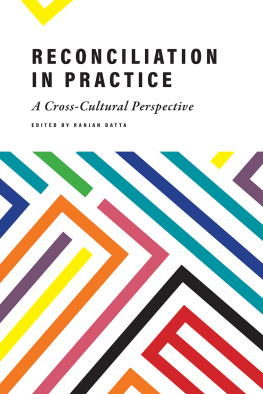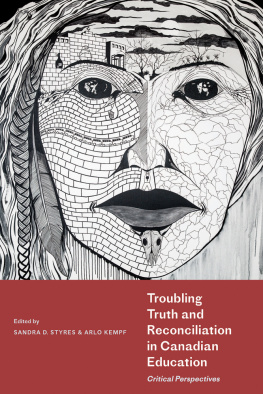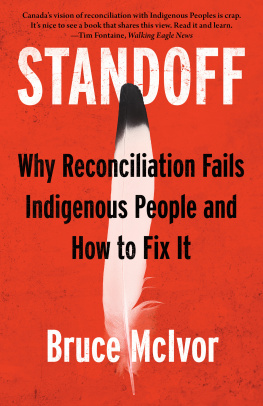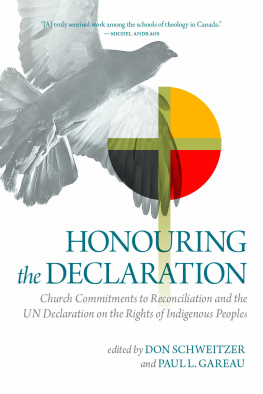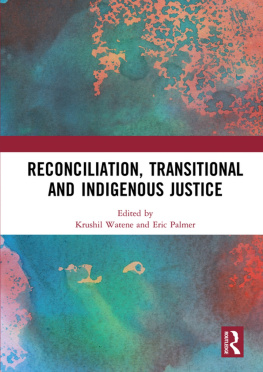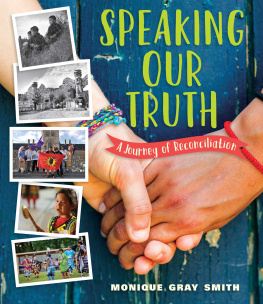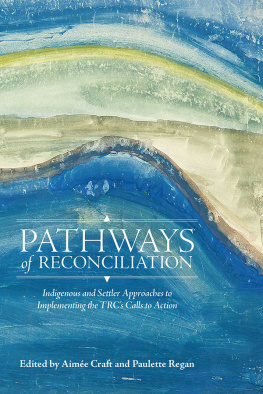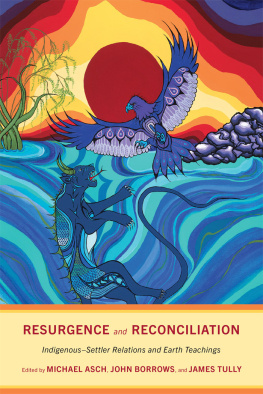RECONCILIATION IN PRACTICE
RECONCILIATION IN PRACTICE
A Cross-Cultural Perspective
EDITED BY RANJAN DATTA
Fernwood Publishing
Halifax & Winnipeg
Copyright 2020 Ranjan Datta
All rights reserved. No part of this book may be reproduced or transmitted in any form by any means without permission in writing from the publisher, except by a reviewer, who may quote brief passages in a review.
Editing: Kaitlin Littlechild
Cover design: Jess Koroscil
eBook: tikaebooks.com
Printed and bound in Canada
Published by Fernwood Publishing
32 Oceanvista Lane, Black Point, Nova Scotia, B0J 1B0
and 748 Broadway Avenue, Winnipeg, Manitoba, R3G 0X3
www.fernwoodpublishing.ca
Fernwood Publishing Company Limited gratefully acknowledges the financial support of the Government of Canada, the Canada Council for the Arts, the Manitoba Department of Culture, Heritage and Tourism under the Manitoba Publishers Marketing Assistance Program and the Province of Manitoba, through the Book Publishing Tax Credit, for our publishing program. We are pleased to work in partnership with the Province of Nova Scotia to develop and promote our creative industries for the benefit of all Nova Scotians.

Library and Archives Canada Cataloguing in Publication
Title: Reconciliation in practice: a cross-cultural perspective / Ranjan Datta (editor)
Names: Datta, Ranjan, 1977- editor.
Description: Includes bibliographical references and index.
Identifiers: Canadiana (print) 20190148985 | Canadiana (ebook) 20190149078 ISBN 9781773631707 (softcover) | ISBN 9781773631714 (EPUB) | ISBN 9781773631721 (Kindle)
Subjects: LCSH: CanadaRace relations. | LCSH: CanadaEthnic relations. | LCSH: Reconciliation. | LCSH: ImmigrantsCanada. | LCSH: Indigenous peoplesCanada. | LCSH: ColonistsCanada. | LCSH: Social justiceCanada. | LCSH: ColonizationSocial aspectsCanada. | LCSH: DecolonizationSocial aspectsCanada. | CSH: Native peoplesCanada.
Classification: LCC FC104 .R43 2019 | DDC 305.800971dc23
CONTENTS
Part One
Understanding Reconciliation
Part Two
Taking Responsibility for Reconciliation
ACKNOWLEDGEMENTS
First and foremost I want to thank Drs. Alex Wilson, Linda Smith, Marie Battise, Manulani Meyer, Shawn Wilson, and Verna St. Denis for their continuous motivation, encouragement, and enlightenment for unlearning and relearning who I am and who I need to be. I am also grateful to the Indigenous Peoples in Canada, particularly Indigenous Elders, Knowledge Keepers, leaders, and youth who so warmly welcomed my family to their land and community and provided opportunities to learn the meanings of land and sustainability stories. I also thank my friends (too many to list here but you know who you are!) for providing the support and friendship that I needed. I am sincerely grateful to Mel Sysing with whom I initially started the conversation for this project. Finally, I owe a lot to Candida Hadley (Acquisitions and Development Editor, Fernwood Publishing) for being supportive throughout her time here and for helping me with the editing of this book.
ABOUT CONTRIBUTORS
Ali Abukar is a refugee and new immigrant in Canada. He has a bachelor of arts (BA) and a master of social work. He is currently the executive director of Saskatoon Open Door Society, an organization that provides settlement and integration services to newcomers to Canada. Previously, he worked with immigrants and refugees in Egypt and Uganda. Ali has more than ten years of experience in the sector of settlement and integration of immigrants and refugees. He is a trained social worker, community builder, and advocate for immigrant and refugee rights. Ali considers himself a global citizen and wants to see the impact of his work across the globe.
Chris Scribe is Nakoda/Cree from the Kinosao Sipi Cree Nation and Nakota Oyate Assiniboine Nation. Since obtaining his bachelor of education degree from the Indian Teacher Education Program ( ITEP) in 2005, Chris has taught every grade in the K12 system. Upon completing his master of education (MEd) in educational administration, Chris went on to become a principal and administrator for the Mosquito First Nation School. In 2014, Chris began work at the University of Saskatchewan as the director of the ITEP. Chris is also in the process of completing his PhD in educational administration at the University of Saskatchewan. Throughout his professional and academic career, Chris has always been an advocate for Indigenous knowledge and values above all else.
Colleen J. Charles is Woodland Cree from the Lac La Ronge Indian Band in northern Saskatchewan. She is a single mother of three children and has a granddaughter. She is a certified anti-racism education facilitator. Colleen has her MEd from the University of Saskatchewan. She has a BA and an Aboriginal Human Justice diploma from the First Nations University of Canada. Also, she has a recreation and leisure management diploma from Saskatchewan Polytechnic. She credits her mother for her strong qualities. Colleen has been presenting her art workshop, Colonialism on Canvas, for the past two years.
Farzana Ali is a new immigrant and international doctoral researcher in Canada. Being a pharmacist by training, her goal is to become a community-engaged scholar by facilitating and supporting the conversion of existing and new health research into measurable improvements for patients of diverse backgrounds. Her research interests include the following: patient-centred care, Indigenous health and OCAP principles (ownership, control, access, and possession), immigrant and refugee health, social determinants of health, and community-based participatory research. She is currently coordinating community-based HIV research to reduce barriers and build capacity by harnessing rich experiences, perspectives, and recommendations from both Indigenous and non-Indigenous Peoples living with HIV.
Irja Seurujrvi-Kari has a PhD in Smi and Finno-Ugric studies. She is a researcher of Indigenous Studies and a retired Smi lecturer of Smi studies at the University of Helsinki. Her dissertation Ale jaskkot eatnigiella (Meaning of Indigenous movement and language to Smi identity), which deals with the Indigenous movement and the role of language in it, was published in 2012. She has co-edited several anthologies of the Smi people and their culture. The Saami: A Cultural Encyclopedia was awarded the State Prize Award by the Ministry of Education in 2005. In addition to her academic work, she has been the chairman and a board member of the Smi Parliament, the Smi Council, and the World Council of Indigenous Peoples, as well as several other Indigenous organizations since the 1980s.
Janet McVittie is a faculty member in the Department of Educational Foundations, College of Education, University of Saskatchewan. Her current research areas are place- and land-based learning and the role of more natural areas for promoting healthy, holistic human growth and learning. This involves recognizing differences in the concepts of land ownership and the inherent value of land, as well as working toward greater social equity among people. She has been fortunate to work with Indigenous colleagues, which means learning again and again of the privileges she carries due to the colour of her skin.
Jebunnessa Chapola is a BangladeshiCanadian feminist, researcher, singer, cultural performer, community radio host, social justice activist, and community volunteer. Currently, she is a PhD candidate in the Department of Womens and Gender Studies at the University of Saskatchewan. She attended postsecondary institutions in Bangladesh, Sweden, and Norway.

